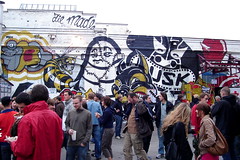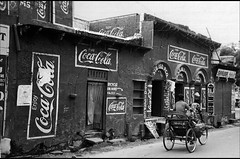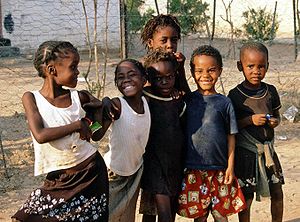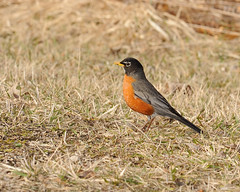At the station, a young woman eats a muffin-top, obviously unawares of Elaine’s desire to profit from her, and the fact that it is best if one avoids acting out episodes from Seinfeld in you day to day existence on this planet. Anyway, this muffin top eater is stunningly beautiful in her black hot pants and liquorice leg stockings and stilettos. Half way through her treat she packs it away for later, grabs her coffee and walks off proudly to ignore my gaze. In her heart, though, I think she thinks that she is not quite beautiful enough for the world. There is no confidence in her demeanour, just false pride. She fact fears the mirror far more than she does my gaze.
| Photograph from The Age |
The sun shines brightly warming the air. The flowers have finally bloomed, and the women who are out and about are more lightly clad than before.
Others stand around the platform warming themselves in the gentle morning sun waiting for the train to arrive. The birds are singing in the distant trees. It is the first hot day of spring, and a gentle sea breeze has picked up already against the deep azure of the sky. It is the type of day when everything has an intensity that on any other day would not be so noticeable: The colours seem brighter, the smiles larger. A young woman feels her hair, all nice and warm in the sun, her bare arms soaking up the rays.
Once on the train, people maintain a safe distance from one another, unfolding their broadsheets to hide behind, listening cocooned with their iPods and sunglasses on, or checking the messages on their mobile phones. I often wonder whether they are actually performing the task that such a gesture would imply, or that there is a deeper meaning to what they are doing. Are they reading or hiding. Are there actually any messages on their mobile, or are they just hoping to receive one and in fact are lonely? I will never know for sure, but what my body gives me the ability to do, is to allow their body to speak to me.
This is not a particular power I alone possess, but because I notice that I do possess it, I am willing to allow other bodies in space to have a similar ability at least to do what I can do. Of course, I can also go off on flights of fantasy, and imagine that other human bodies have the same capacity, as they are recognisably similar to mine, and different from other bodies that I encounter in my life, such as dogs, cats, cows and sheep. For instance, I may recognise similar attributes in an insect, but these are not of the same order, as I would think of a human body possessing. I can deduce from their behaviour the shared and separate characteristics, and notice that human bodies can change their behaviour to mimic that of the other bodies I encounter, but that these in turn can rarely affect such mimicry in return.
In the carriage as it moves along, people have already ordered themselves into something of a class system. Men and woman in suits tend to sit together, mothers and children with older women and a quiet single woman. The more raucous gather at the end of the carriage, and in this way, harmony is maintained to a degree at least. So long as this fragile order is not disturbed by someone unwilling to maintain there place in the order, all seems to maintain an uneasy but fluid structure. People, who come and go, leave and join this structure, read from the position of the others within the carriage as they do so: by the clothes their fellows are wearing and the activities that they are pursuing; whether it be talking loudly, sitting quietly and reading or looking out the window. As they come and go, they leave gaps in this microhabitat that are filled by new passengers or a reshuffling of those already present.
This is a microcosm of society in transit, but not just any society, nor even a representative cross-section of a particular sub-section of an historical habitat. It is both at one and the same time, a cross-section of all transitory movements of human beings and of all human society up until the train left its station and of all the possible human societies in the future. It is all present in this carriage to be read, but the reading itself disturbs the equilibrium of those read, as the reader him or herself is at one and the same time separate to and a part of this transitory historical train. I am both an observer and a participant in this historical moment, and so, it exists as part of me and me of it, and there is no way that I can extricate myself from this project and still remain an observer anymore than I can fully immerse myself and continue to observe.
I cannot escape my historicalness and be outside of myself. I am always trapped by my gaze and its mirroring by other sentient beings who also gaze on me, even if they do so by gazing at their mobile phones. I am in their smell just as I smell them, and it is not necessary that this sense be above a threshold to exist in actual fact. Even if the turning of the newspaper is masked by the sound of the steel wheels rolling over the cracks in the tracks, I can still hear this sound, as too can the reader of the paper and those surrounding him or her. But as much as they or I want to escape this particular moment we cannot, as we are surrounded by a factual world of sunshine and warmth, now doubt simultaneously here as across this entire city today.


























